Football
The evolution of Wales captain Gareth Bale
Published
2 years agoon
By
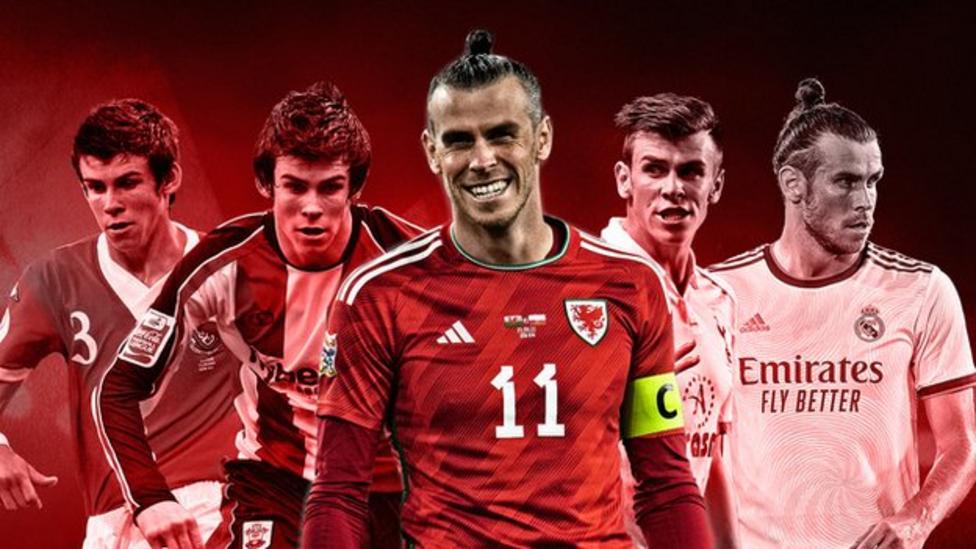
Trawl through the BBC Wales Today archives and you might find a 16-year-old Gareth Bale leaving his parents’ house in Cardiff and being driven to Southampton for a training session.
Long before making the man bun his signature look, the fresh-faced Bale is sporting an Inbetweeners quiff as he sits in the back of the car, discussing his future in the game with a croaky adolescent voice which is still some way from breaking.
Seventeen years on – and five Champions League titles, two major international tournaments and a vast array of individual accolades later – Bale is set to become the first man to captain Wales at a World Cup since 1958.
By now, the 33-year-old is a modern great; his country’s all-time leading scorer in men’s football and a globally recognised figure who has shone on the grandest stages in the club game.
This is the story of how Bale came to this point, delving into five key stages in the evolution of a football icon.
A teenage Beckham at left-back
It’s the opening day of the 2006-07 Championship season and Derby County’s Pride Park is a picture as warm August sunshine lights the pristine green turf.
An hour into the game a gentle hum emanates from the stands, the home fans content as their team lead 1-0, seemingly unconcerned as Southampton’s teenage left-back stands over a free-kick around 25 yards from goal.
That 17-year-old is Gareth Bale, starting only his second game as a professional. He swings his left foot at the ball and arcs it beyond the reach of Lee Camp into the top right-hand corner, a sublime goal.
Three days later, he scores with another free-kick against Coventry City, 10 yards further out but again struck with the precision and curl to leave another goalkeeper, Andy Marshall, floundering.
If Bale was a relative unknown before the season started, plenty are taking notice after two games.
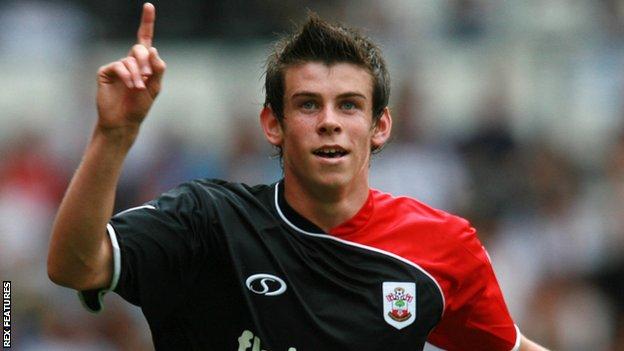
Not that Wales need reminding. By this stage Bale is already his country’s then-youngest senior international having appeared as a substitute against Trinidad and Tobago in May 2006, two months before his 17th birthday.
Bale then breaks another record in October, becoming Wales’ youngest goalscorer with another curling free-kick – fast-becoming a trademark – to offer fans at Cardiff’s Millennium Stadium a ray of hope during an otherwise demoralising 5-1 thrashing by Slovakia.
It is striking how similar the three goals are: all measured, meticulously lifted over the wall and curling from left to right.
“Gareth is a special one,” says George Burley, Southampton’s manager at the time. “He has got attributes that top players haven’t, like his quality of free-kicks, which is like David Beckham.”
A decade later Bale would spearhead Wales’ epic journey to the Euro 2016 semi-finals thanks in part to yet more free-kick goals – but struck with a new style.
Gone was the Beckham-esque curl and control and in its place was the power, dip and vicious swerve that the likes of Cristiano Ronaldo and Didier Drogba had popularised.
Asked during Euro 2016 why he had abandoned his original approach, Bale simply shrugged and said he found it “boring”.
Ten years apart, the changes to his free-kick technique demonstrated how Bale could transform his game over the course of a stellar career; a player of rare – and metamorphosing – quality.
From Spurs outcast to Champions League menace
It is a scene which has by now acquired near mythical status in Champions League lore.
Tottenham are 4-0 down at Inter Milan in 2010 when a 21-year-old Bale announces to the world his spectacular conversion from left-back to marauding winger.
Still wearing number three on his back, Bale’s first goal is essentially a one-man counter-attack, bursting clear of Inter’s defenders and into the penalty area before drilling a left-footed finish into the far bottom corner.
The second is nearly identical, again beating the great Javier Zanetti on the outside before whipping in with his left foot, and then the third is a first-time effort rifled low into the same corner.
The hat-trick was in vain as Spurs lost 4-3 but Bale was arguably even better against the same opponents at White Hart Lane two weeks later as he terrorised Brazilian right-back Maicon and created two goals in a rousing 3-1 win.
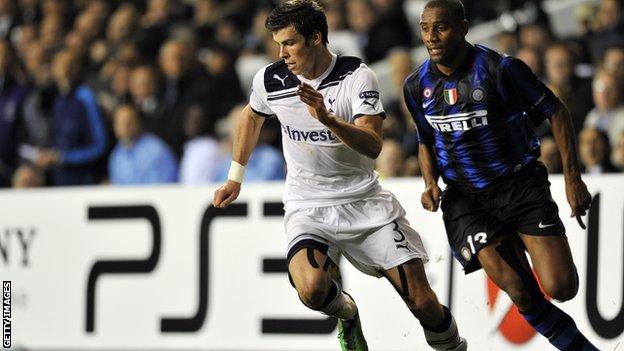
It was some statement from a player whose difficult start at the club had even led the manager at the time, Harry Redknapp, to wonder if he was cursed.
Tottenham had seen off competition from clubs such as Manchester United to sign Bale in 2007 but he initially struggled with injuries and a statistical quirk that showed he had failed to win a Premier League game over the course of two years and 24 fixtures.
Redknapp admitted that losing record had made him reluctant to select Bale – who was reportedly close to leaving Spurs – but the turnaround was stunning.
The performances against Inter would become a template for Bale, who combined his blistering pace and direct running with an ability to score with long-range thunderbolts.
It was a potent mix which made Bale unplayable at times. He was voted PFA Players’ Player of the Year in 2011 and again two years later, this time alongside the PFA Young Player of the Year and Football Writers’ Association Player of the Year awards.
Having conquered the Premier League and dazzled in Europe, Bale was ready for the next stage of his journey.
Ascending to Galactico status – for club and country
Real Madrid made Bale the world’s most expensive footballer when they paid Tottenham £85.3m to sign him in 2013.
If his otherworldly feats at Spurs had given Bale a swagger, becoming a Galactico imbued him with an air of invincibility.
That was evident when he returned home to play for Wales, even in the kind of friendly match some of his club colleagues may have snubbed.
Iceland visited Cardiff City Stadium in March 2014 and, as Wales led 2-1 with 20 minutes left, Bale picked up possession deep in his own half near the right touchline.
He was momentarily forced off the pitch by an attempted foul from Solvi Ottesen but stayed on his feet, surged forward into the penalty area, cut inside on to his left foot and fired into the bottom corner.
“I just asked him for an autograph and a photo,” Chris Coleman, Wales’ then-manager, joked after the game. “He’s one of the best I’ve seen. An unbelievable player.”
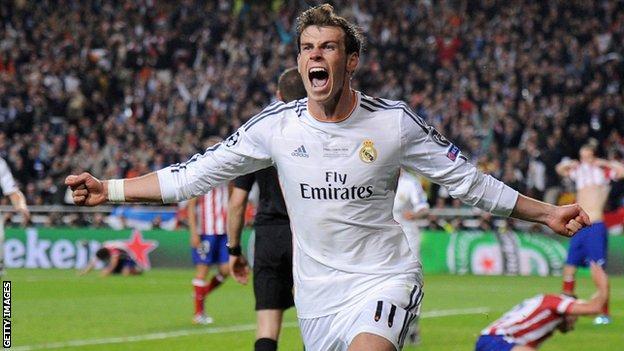
Bale was making a habit of embarrassing opponents and, as if to prove he could do the same to anyone, a month later he scored with a mirror image in one of football’s most storied fixtures.
Real faced arch rivals Barcelona in the Copa del Rey final and were drawing 1-1 with five minutes left when Bale again received the ball inside his own half, this time on the left.
Barcelona defender Marc Bartra tried desperately to drag him down but Bale shrugged him off and, despite again being briefly forced off the field, he motored into the box and poked the ball past goalkeeper Jose Pinto to spark ecstatic celebrations.
The goal earned Bale his first trophy with Real and, one month on, he had his second as he scored in the Champions League final victory over Atletico Madrid.
As Bale and his team-mates returned to Madrid to celebrate with a trophy presentation at a sold-out Bernabeu, the Welshman was in his element.
He had finished his first season with 22 goals and would follow that with 18 in his second campaign – but there was turbulence ahead.
Jeered in Madrid, loved in Wales
Bale won five Champions League and three La Liga titles – as well as several other domestic and international cups – during his nine years with Real Madrid.
During the second half of that period, however, his relationship with the club became strained as injuries affected his form, while the Spanish media and Real’s fans were unforgiving in their criticism.
Even as he was pushed to the periphery, Bale could still conjure flashes of genius at critical moments, such as the outrageous overhead kick he scored after coming on as a substitute in the 2018 Champions League final win over Liverpool.
Yet it was still clear he was unhappy. In an interview on the pitch afterwards, Bale said he was already contemplating a future away from Madrid.
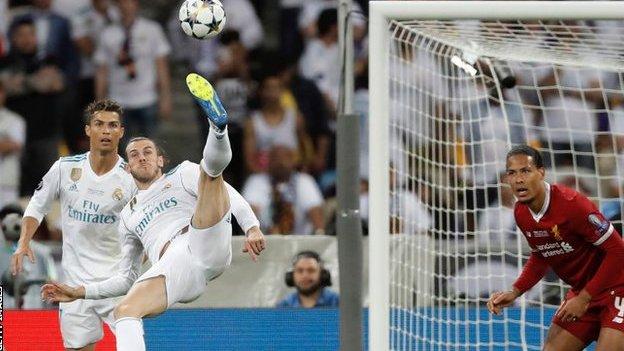
It would take another four years before he would leave Real permanently and, although Bale ignored the jeers of his own club’s fans to continue playing at the Bernabeu, his opportunities to return home and play for Wales became a soothing antidote to the hostility he faced in Spain.
At this stage, Bale had already established himself as a Welsh icon, but this particular period brought him closer to his country and its supporters.
Wales fans already loved Bale for all he had achieved, most notably his pivotal role in helping the team qualify for Euro 2016 – their first major tournament for 58 years – and then the inspirational performances he produced on their momentous run to the semi-finals in France.
When he was confronted with such a fraught situation in Madrid, however, it was clear that Bale needed Wales as much as this footballing nation needed its talisman.
Wales fans followed events in Spain and felt increasingly protective of a player they idolised, one they felt was being treated unfairly at his club.
Bale felt that love and was not afraid to show where his truest loyalties lay.
On the eve of a Euro 2020 qualifier in Azerbaijan in November 2019, having endured the latest round of criticism from Spanish media, he said: “I definitely have a bit more excitement playing for Wales.”
That irritated Real’s former striker and director of football, Predrag Mijatovic, who claimed Bale prioritised Wales – and even his interest in golf – over his club side.
That prompted one Wales fan to print a flag, which he displayed at a match against Hungary just days later, reading: “Wales. Golf. Madrid. In that order.” After Wales beat Hungary to seal qualification for Euro 2020, Bale was handed the banner and was pictured holding it alongside his team-mates.
That was effectively the end for Bale and Real Madrid. Not that it affected the man himself, whose commitment to his country was not up for debate, and it only enhanced his legend among Wales fans.
The episode heralded another chapter in Bale’s development: the unapologetic national figurehead.
The moments man who still writes his own scripts
As Bale entered the autumn of his career – and the final throes of his time with Real Madrid – he found himself in the unusual position of playing more regularly for his country than his club.
Last season, he made 10 appearances for Wales and only seven for Real. This disparity meant that before Wales’ World Cup play-off semi-final against Austria in March this year, Bale had played just two hours of football in six months for Real.
With Wales two wins away from qualifying for a first World Cup since 1958, there were concerns that their captain was undercooked.
Then Bale reminded everyone that he writes his own scripts.
There were some familiar motifs to this latest Bale screenplay: more criticism from Spain (described as a “parasite” this time for prioritising Wales over Real), a high-stakes situation and the logic-defying ability to summon moments of staggering brilliance when they are needed most.
The first goal was plucked right from the greatest hits – a sumptuous 25-yard free-kick lashed into the top corner – and the second was from closer range but of similar majesty, hit on the run and with equal precision.
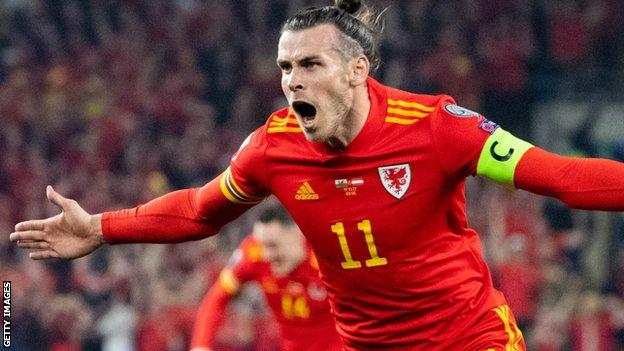
This is the latest iteration of Bale. The pace has faded, as has Bale’s ability – and appetite – to run at defenders.
But now at the age of 33, Bale still has an arsenal of weapons which compensate for the gradual decline of his previous physical superpowers.
His technique remains exemplary, as does his aerial ability and eye for a spectacular long-range strike, while his greater nous and experience means he is now more selective with his movements.
With all this intact, Bale still has an aura. His mere presence continues to unsettle opponents.
It perhaps explains why Ukraine captain Andriy Yarmolenko threw himself towards Bale’s free-kick and diverted it into his own net to hand Wales the only goal in their World Cup play-off final in June.
Bale admitted after the game that he was some way off his best but, in that moment, once more he was able to decide the result by sheer force of personality.
Later that month, after a long and drawn out exit from Real Madrid, he joined Los Angeles FC and, while injuries continue to limit his playing time, Bale is happy to be at a club where he feels valued and wanted.
Wales, meanwhile, are thankful for this generational talent they still have.
Bale said at the beginning of this campaign that playing at a World Cup was his greatest remaining ambition. Now he is just days away from realising that dream.
The captain has hinted he could continue playing international football at Euro 2024 and beyond, so the World Cup may not be his final act – but it feels like the missing piece.
Bale is no longer the electrifying Tottenham winger who tormented defences in the Premier League and across Europe, nor is he the all-action Galactico who scored some of Real Madrid’s most iconic goals of the past decade – but he remains a phenomenon who can still bend the course of a match to his will.
Wales do not mourn who Bale no longer is, they celebrate all that he has done, and cherish the player he is today.
Reports /TrainViral/
You may like
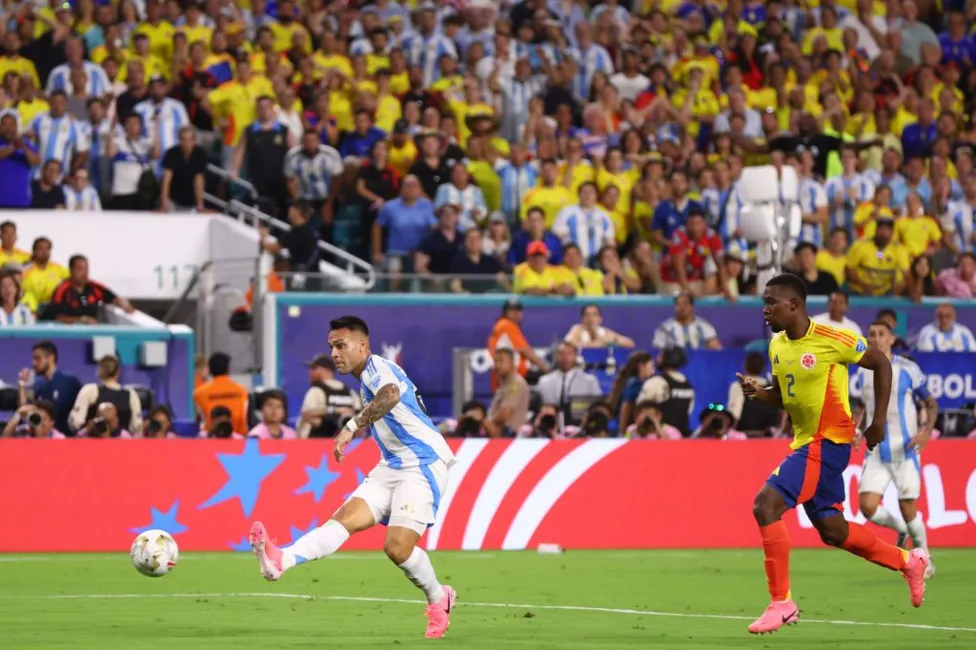
Argentina beat Colombia to win a record 16th Copa America but the game was marred by the kick-off being delayed by 80 minutes because of trouble outside the ground in Miami.
Lautaro Martinez struck in the second half of extra time from Giovani lo Celso’s through ball to secure the win.
Captain Lionel Messi was left in tears when he had to be replaced midway through the second half after injuring himself while chasing for the ball – but was celebrating his country’s third successive major tournament at the final whistle.
Kick-off was delayed because of chaos outside the Hard Rock Stadium.
Organisers said ticketless fans tried to get into the ground, leaving some fans waiting for hours in the Miami heat for the gates to open.
Fans and police officers and security clashed with several arrests made. Several supporters needed treatment from paramedics.
On top of that the half-time break lasted for 25 minutes because of a concert by Colombian popstar Shakira on the pitch, a move that was criticised by Colombia boss Nestor Lorenzo beforehand.
It was a game of few clear chances in hot, humid conditions, with Colombia’s Jhon Cordoba hitting the woodwork in the first half.
Argentina thought they had taken the lead with 15 minutes to go but Nicolas Tagliafico’s effort was ruled out for offside.
Martinez would end up as the hero – and win the Golden Boot with five goals.
What now for Messi after Copa America glory?
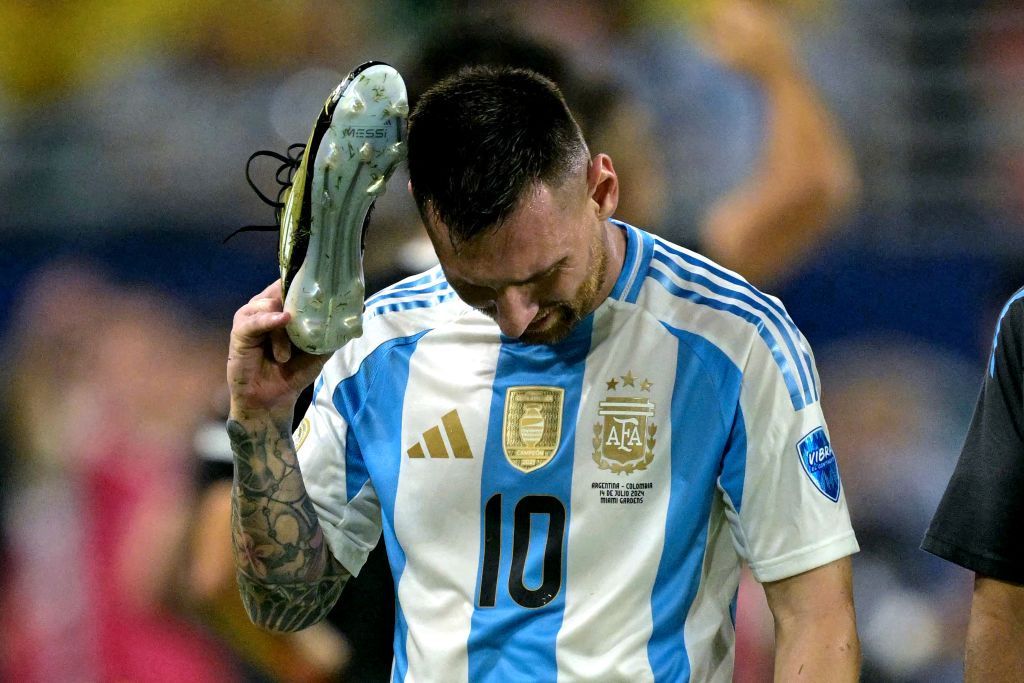
Lionel Messi went off injured in the second half
Messi had never won a senior international tournament until the age of 34 and now he has won three in three years after the 2021 Copa America and 2022 World Cup.
The final was played at the Hard Rock Stadium in Miami – which is just over 20 miles from the city of Fort Lauderdale, where Messi’s Inter Miami club play.
The 37-year-old said before this tournament he had yet to make a decision on whether he will play on for his country until the next World Cup, which is also in the US – as well as Canada and Mexico.
His powers seem to be waning and his only goal of the tournament came in the semi-final win over Canada. He missed a penalty in the quarter-final shootout against Ecuador.
In this game he was hurt by a tackle in the first half and hobbled off in the second period, holding an ice pack on his ankle on the bench.
Is this his final major tournament appearance of a legendary career?
It was certainly the final appearance of Angel di Maria’s international career. The 145-times capped player had already announced he would retire from the international stage after this.
Trouble before the game
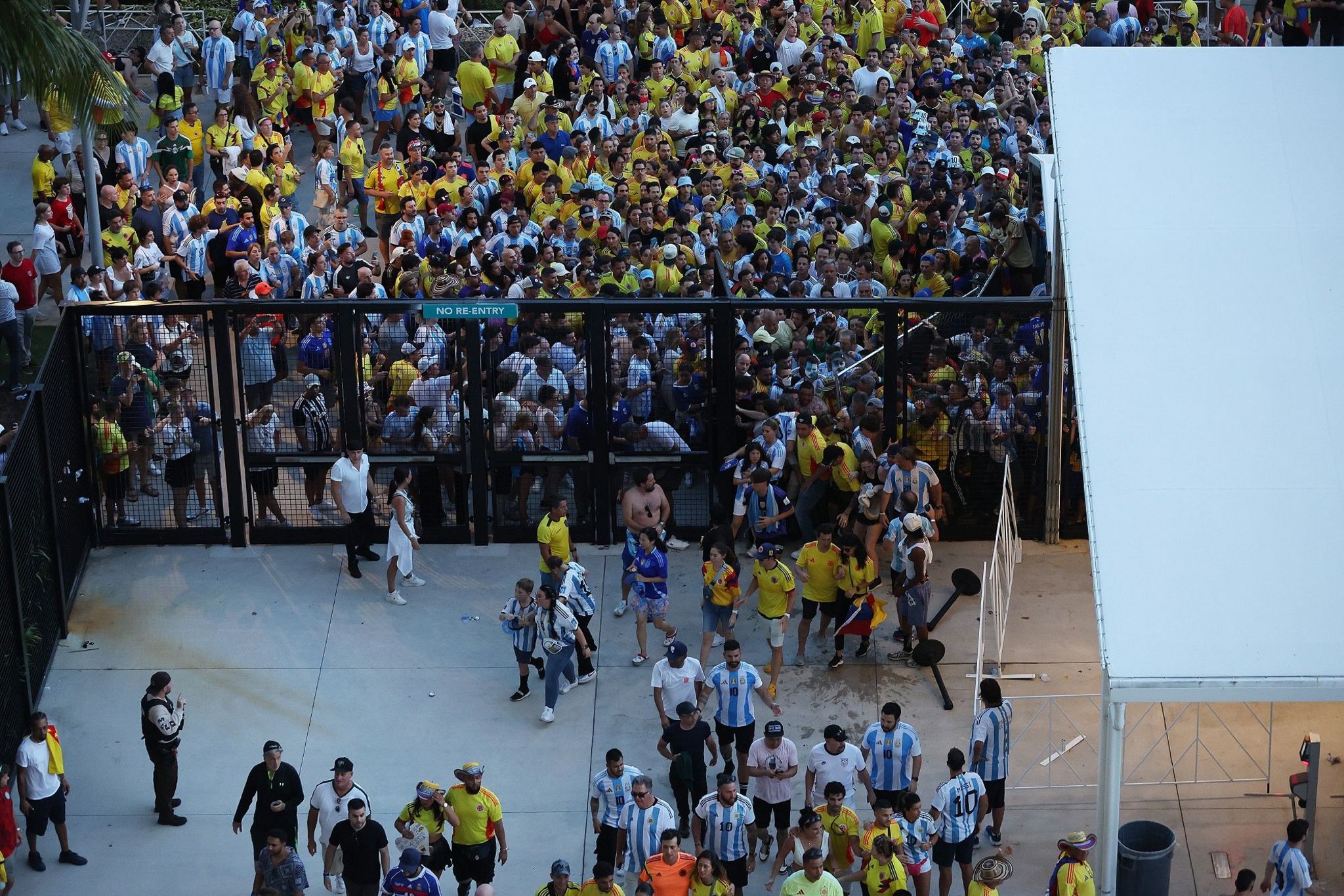
There were problems getting fans into the ground for kick-off
The delays before the game were more bad news for organisers – with the Hard Rock Stadium due to host games at the 2026 World Cup.
In the semi-finals in Charlotte, Uruguay players clashed with Colombia fans after the final whistle – because they were worried about the safety of their families.
Players’ families were affected too in Miami.
Roberto Garnacho, brother of Argentina winger Alejandro Garnacho, wrote on social media: “What a shame CONMEBOL, the families not being able to enter the stadium, unbelievable.
“We were with [Argentina defender Marcos Acuna’s] family outside, getting away from the fights… Argentina’s security had to come get us, children of players crying, people entering without tickets.”
Colombia’s wait goes on
Colombia had been unbeaten in 28 games, a run stretching over two years going back to a World Cup qualifier against Argentina.
But their only Copa America triumph remains the 2001 success in their home country.
They had chances against the Argentines, most notably when Cordoba hit the post early on with a hooked volley.
Writtes /BBC/
Reports /Trainviral/
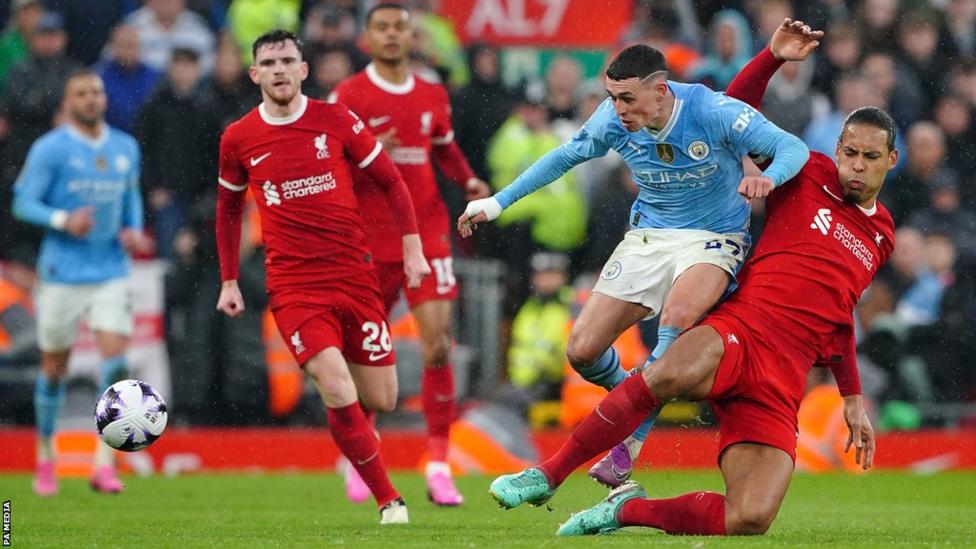
I know from my own experiences as a Liverpool player that, when you are losing at Anfield then equalise straight after half-time, it does more than give you momentum – it can change the whole feel of a game.
That is what exactly what happened in Sunday’s draw with Manchester City. As soon as Alexis Mac Allister’s spot-kick made it it 1-1, Liverpool put on a real powerhouse performance and they looked like they would go on to win.
Their work ethic, tenacity and intensity in the second half was incredible and It was Darwin Nunez who helped instigate that, firstly by winning the penalty for their equaliser.
Yes, it was a mistake by Nathan Ake, whose poor backpass let him in, but Nunez was switched on and ready for it – and he did not stop there.
Lots of Liverpool players did well after the break but Nunez was the one who really made the difference when they were on top. Like so many other teams this season, City struggled to cope with his physicality and all-round play.
I really do believe his display was as good as any I’ve seen from him since he joined Liverpool in the summer of 2022, which is a strange thing to say about a striker who didn’t score.
I loved his energy and his willingness to run without the ball, hassling City’s backline and stretching their defence, but he also showed great quality with it too. He slipped Luis Diaz in for one of his big chances and was involved in almost all of them in some way.
Nunez was unselfish with so much of his play but he was also unlucky not to get a goal himself when he got a toe to Andy Robertson’s cross. City keeper Stefan Ortega made a great save and, on another day, that goes in.
- Liverpool and Man City fight out pulsating draw
- Relive Liverpool’s thrilling draw with Manchester City
- Who will win the Premier League title?
‘Van Dijk is the one player Liverpool cannot afford to lose’
You don’t get anything against City without defending well too, and I was also really impressed by that side of Liverpool’s performance.
I expect a lot of Reds fans were nervous when they saw the teamsheet before the game, because out of their first-choice back five – including goalkeeper Alisson – only Virgil van Dijk faced the defending champions.
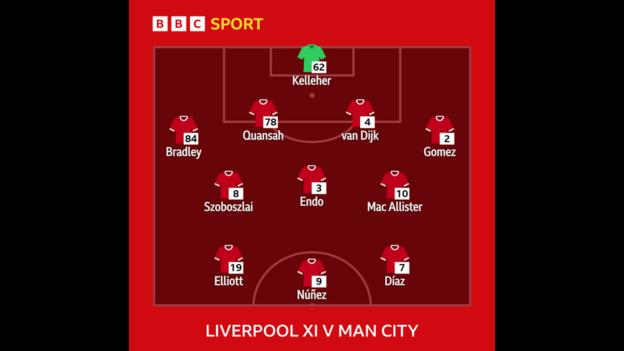
Ibrahima Konate’s injury this week meant the whole right side of Liverpool’s defence was very young, with Jarell Quansah next to Conor Bradley. Jurgen Klopp again showed his faith in the kids by playing them, and they both did really well in what was arguably the biggest game of their careers.
It was another example of the brilliant togetherness and belief that has got Liverpool so far this season, and kept them in this title race, and in with a chance of winning four competitions despite being affected by so many injuries.
By that I mean, when the chips are down and some big players are not around for the big games, they do not falter or feel sorry for themselves.
They also don’t sit back, whoever they are playing. One of the big strengths of this team is they don’t change they way they play even when some star names are missing – and still look to play on the front foot.
At the heart of it all, though, is Van Dijk. Some of his passing against City was phenomenal, as always, but on top of that, his last-ditch defending was outstanding.
There was the one-on-one with Erling Haaland where he stayed calm and in control, a crucial far-post header from a Bernardo Silva cross and an important block to deny Phil Foden.
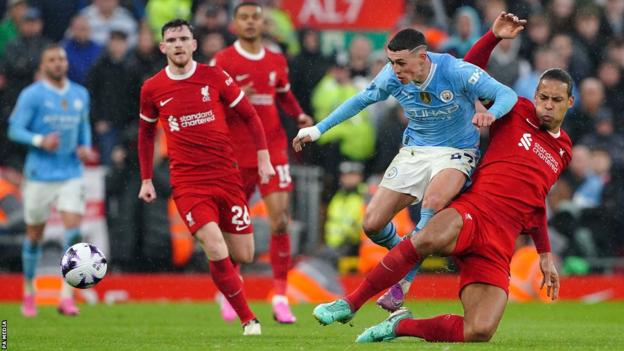
It was a monumental performance, exactly when it was needed, by a guy who was surrounded by several players who had not played in an occasion like this before, and one that some people viewed as a title decider.
Van Dijk has been terrific all season, of course, but this particular game showed the importance of his presence.
Konate could miss a couple of games and Liverpool will be fine. Trent Alexander-Arnold and Robertson have been out for several weeks already, and the biggest compliment I can pay to Caoimhin Kelleher is that he never looks like a back-up goalkeeper when he replaces Alisson.
Klopp has also got the numbers to rotate in midfield and all the front players have had injuries at some point this season. But, at the moment, Van Dijk is the one player they cannot afford to lose.
That’s how important he is to their title hopes, and where their whole season goes from here.
Why the run-in will be a rollercoaster ride
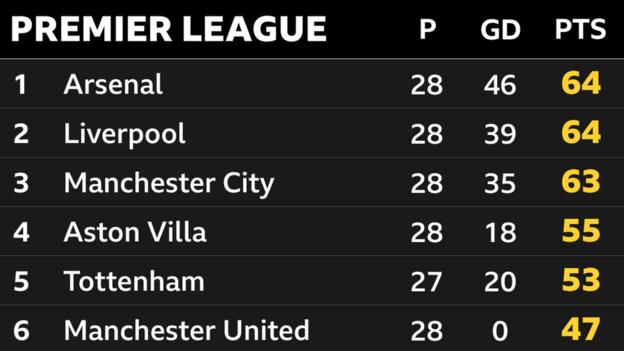
Sunday’s game was a brilliant watch, with such quality on show from both sides.
If Diaz had taken one of his chances then, with the Anfield crowd and the momentum Liverpool had at that stage, I feel like they would have probably seen City off.
Credit to City, though, because they hung in there and had a couple of excellent chances in the second half themselves.
Jeremy Doku hit the post after Kelleher had denied Phil Foden at a really crucial time and, for all the opportunities Liverpool created, they could still have been beaten.
When the dust settles, I think they will be content with the result – they have now played and drawn with City twice in the Premier League, and they are still a point ahead of them with 10 games to go.
Liverpool could soon be in an even stronger position, because City play Arsenal in their next league game, on 31 March. At least one of their title rivals will drop points then, but it would be naïve to think that game will decide anything.
We have got three brilliant teams in this title race, who have all got great strength in depth. But I am not convinced any of them will go on from here and win every game in the run-in, which Liverpool and City have both done in previous seasons, because they have all appeared a bit vulnerable at times.
Look at Arsenal – they have been on this amazing goalscoring run but they still needed Aaron Ramsdale to make a couple of great saves in their win over Brentford on Saturday, and had to wait to score a late winner.
There were some nerves involved in their performance, inevitably, and there are plenty more of those to come.
The one team you would not expect to suffer in that way, emotionally, are City because of what they have been doing for so many seasons now. But I still expect it to be a rollercoaster ride for all three teams and it would not surprise me if they are all still involved with a couple of games to go.
It is going to be fascinating to watch it unfold, whoever you support. Even if you have a fondness for one of the teams, every football fan loves watching close competition with jeopardy involved.
— Reports /TrainViral/
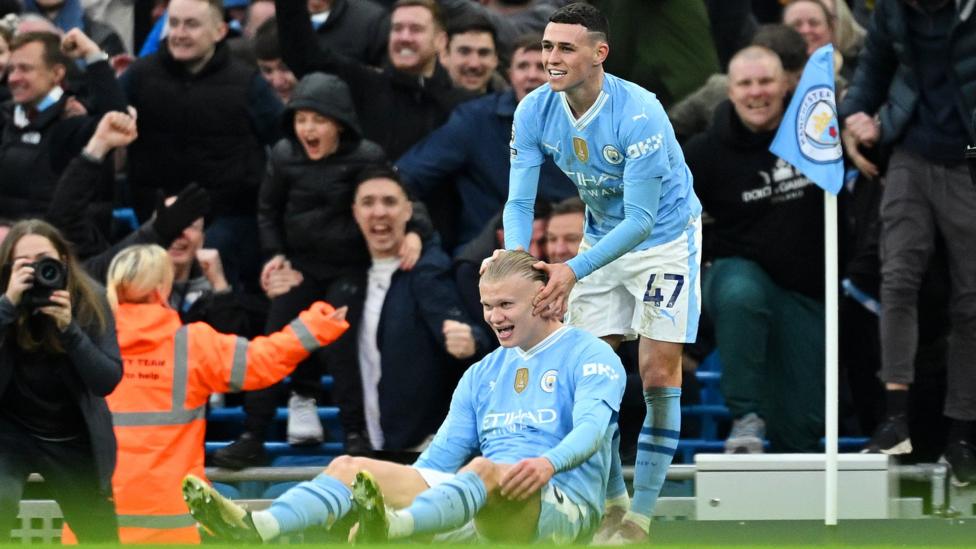
Manchester City boss Pep Guardiola said after Sunday’s Manchester derby that midfielder Phil Foden was the “best player in the Premier League right now”.
And Foden has a strong case for that accolade, having scored six goals and provided an assist in his past seven league games.
Using the past 10 rounds of Premier League matches, BBC Sport look at who might currently be its ‘best’ player.
Phil Foden (Manchester City)
Foden scored twice in a 3-1 win over Manchester United on Sunday as City stayed firmly in the hunt for the title.
The 23-year-old has scored 11 Premier League goals this season and assisted seven – putting him joint-eighth in the rankings for those categories.
Guardiola: “What can I say? He is the best player in the Premier League right now for the amount of things he does. Unbelievable.”
BBC Radio 5 Live commentator John Murray: “If England were playing their first match at the Euros later today, I think you would expect to see Bukayo Saka on the right, probably Phil Foden on the left, Harry Kane through the middle and Jude Bellingham in the number 10 position.”
Erling Haaland (Manchester City)
Haaland tops the Premier League goalscoring charts on 18 – two clear of everyone else. That is despite missing five matches so far this season.
Having featured in City’s past seven games since returning from injury, Haaland has scored four league goals and set one up in that time, as well as hitting five goals in an FA Cup fifth-round victory at Luton Town.
Guardiola: “With top scorers or strikers who score a lot of goals, don’t criticise because he will shut your mouth, that’s for sure.”
Former City midfielder Michael Brown: “He’s got that power, he’s got that dedication. That hunger to finish. We’ve seen him mix up his goals. It’s difficult to just not let him do what he does.”
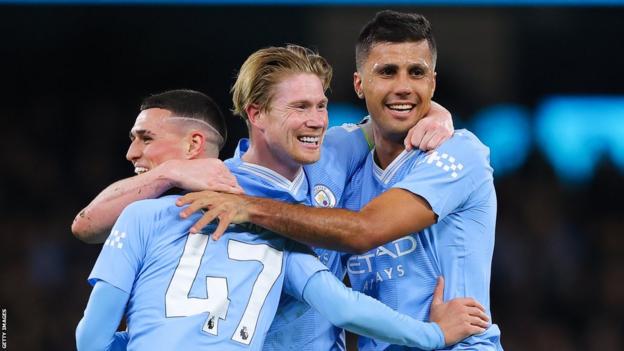
Kevin de Bruyne (Manchester City)
City midfielder De Bruyne has been in superb form since returning from a hamstring injury which meant he missed the first five months of the season.
He has scored once and claimed four assists in seven league games, despite only starting four of them. He also got four assists in the FA Cup win at Luton.
Guardiola: “He is a special player. He is a legend.”
Former City defender Micah Richards: “We talk about lots of players being world class but Kevin is different. He always seems to gauge exactly what the game needs – and he delivers, all the time.”
Rodri (Manchester City)
Rodri has always been capable of producing big moments when it matters – and the midfielder is on a 59-match unbeaten run in City colours.
Naturally a defensive midfielder, he has added more going forward of late, with three goals and three assists in his past 10 league games.
Guardiola: “He’s the best midfield player in the world currently by far because he is able to do everything.”
Luton Town captain Tom Lockyer: “It’s just a joy to share a football pitch with him. You don’t say that about a lot of players.”
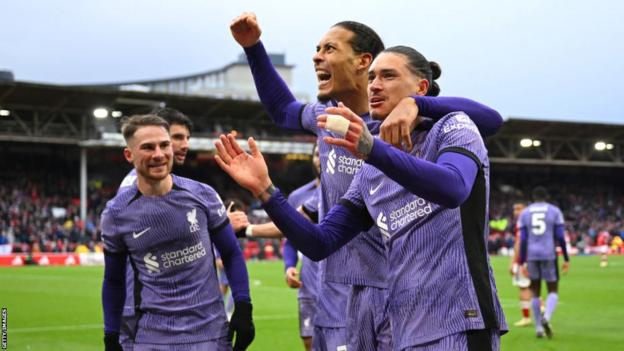
Virgil van Dijk (Liverpool)
Liverpool captain Van Dijk has been one of the few mainstays in a title-challenging Liverpool side blighted by injuries.
In the Reds’ past 10 league games, Van Dijk has scored once, helped keep three clean sheets and also scored the winning goal in last month’s Carabao Cup final against Chelsea.
Liverpool boss Jurgen Klopp: “Virgil van Dijk, from the first day since he stepped into Liverpool FC, is absolutely outstanding.”
BBC Sport journalist Luke Reddy: “Van Dijk has been a ‘colossus’ in recent weeks.”
Darwin Nunez (Liverpool)
Uruguayan striker Nunez has been in fine form for the Reds of late, and scored the last-gasp winner at Nottingham Forest on Saturday.
In Liverpool’s past 10 league games, Nunez has played nine, scoring six goals and getting an assist.
Liverpool assistant manager Pep Ljinders: “Each game, he can create six chances just by himself.”
BBC Sport chief football writer Phil McNulty: “I think Nunez has loads of ability and his stats alone tell you what an impact he has on games. Not one goes by where he does not have influence of some sort.”
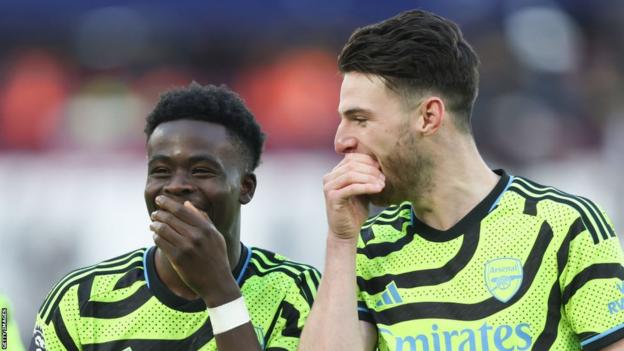
Declan Rice (Arsenal)
Since a British-record transfer to Arsenal in the summer, England midfielder Rice has been a key part of the Gunners’ title challenge this season.
Despite his defensive responsibilities, he has scored once and provided four assists in the Gunners’ past 10 league games.
Former Manchester City midfielder Michael Brown: “Declan Rice can do every bit of being an all-round midfielder.”
BBC Sport football reporter Simon Stone: “I am a huge Declan Rice fan and he could turn out to be the difference between Arsenal fading away in the title race, as they did last season, and really going for it.
Bukayo Saka (Arsenal)
A strong contender for the Premier League’s most in-form player is England winger Saka.
In his past 10 league outings, Saka has scored eight goals, including two apiece against West Ham and Burnley, and added an assist.
BBC Sport football reporter Simon Stone: “[The best player in the league] is between four – Haaland, De Bruyne, Salah and Saka. Whoever wins the title is the best.”
Former Chelsea winger Pat Nevin: “There were plenty of players who caught the eye in Arsenal’s win at Turf Moor, but Bukayo Saka being back close to his best was as important as anything else.”
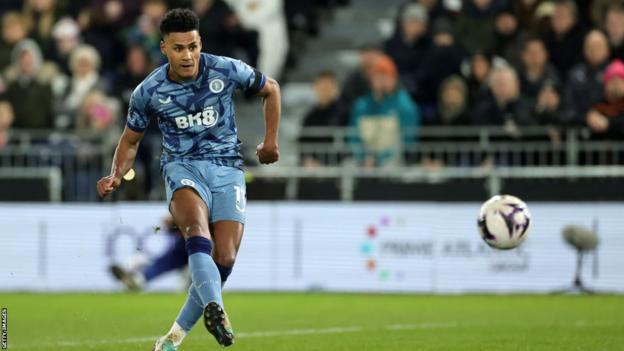
Ollie Watkins (Aston Villa)
Watkins is a player who can go under the radar but is certainly a contender. He is ranked top for direct goal involvements and joint-top for assists this season.
In Villa’s past 10 league games, he has seven goals, four assists and is the only player to pass into double figures in both categories this season.
Aston Villa manager Unai Emery: “His commitment is brilliant and the consequence is this when he works hard every day.”
Former Newcastle and England striker Alan Shearer: “He’s having the season of his life. The form he is in, he is not hoping to score, but expecting to score.”
Cole Palmer (Chelsea)
One of the few bright sparks for Chelsea this season has been midfielder Palmer. He has scored four times and provided the same number of assists in the Blues’ past 10 Premier League matches.
Chelsea manager Mauricio Pochettino: “He is an important player for us. He is a decisive player. I am so pleased with him.”
Manchester City manager Pep Guardiola: “It is not just goals and assists, it is the quality. He is an incredible threat for Chelsea.”
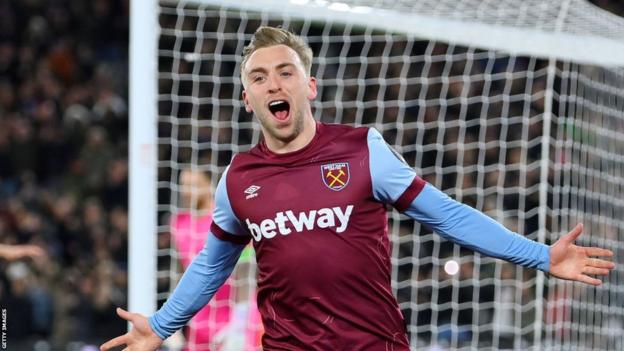
Jarrod Bowen (West Ham)
West Ham winger Bowen is having his best ever Premier League scoring season. having netted 14 times so far.
In the Hammers’ past 10 league matches, Bowen has scored five goals and provided two assists – including his first career hat-trick against Brentford.
West Ham United manager David Moyes: “Some of his performances recently have gone unnoticed because we haven’t won.”
Former Manchester United and England midfielder Paul Scholes to TNT Sports: “You can see Real Madrid, Man City, Arsenal all wanting him. He is a unit and reminds me a bit of Eric Cantona.”
Alphonse Areola (West Ham)
A left-field shout, but from a numbers perspective it is hard to ignore Areola.
In the past 10 games, he’s kept three clean sheets and averaged 5.8 saves per game. He also has the highest save percentage in the Premier League, has made more than 100 saves, conceded four fewer goals than his expected goals against tally suggests he should have, and is the only goalkeeper to save multiple penalties so far this season.
West Ham manager David Moyes: “Our goalkeeper played brilliantly well. He made several saves today that probably stopped Everton getting a result.”
And the rest…
Among those to narrowly miss out are forwards Diogo Jota (Liverpool), Mohamed Salah (Liverpool) and Rasmus Hojlund (Manchester United) – all overlooked because of recent injury issues.
Honourable mentions also go to John Stones (Manchester City), Douglas Luiz (Aston Villa), Ross Barkley (Luton Town), Rodrigo Muniz (Fulham), Caoimhin Kelleher (Liverpool) and Heung-min Son (Tottenham Hotspur).
- Big laughs and top quality content with Elis and John: Join the UK’s youngest and most relevant broadcasters
- Can three million people disappear from public memory? This is the story of the Bengal Famine of 1943
- — Reports /TrainViral/

Father of five blasted for leashing kids, gives them odd nickname

This heartwarming prom story goes viral again and we all understand why

Simon Cowell Won’t Leave Son His $600 M Fortune; Says If He or Future Children Wants to “Start a Business … I’ll Invest. They Aren’t Getting Trusts”

Five wedding outfits for just £29!

Mikhail Gorbachev changed history

Tracking the war with Russia
Trending
-

 Fashion2 years ago
Fashion2 years agoFive wedding outfits for just £29!
-

 Politics2 years ago
Politics2 years agoMikhail Gorbachev changed history
-

 Politics2 years ago
Politics2 years agoTracking the war with Russia
-

 Everything About Youtube2 years ago
Everything About Youtube2 years agoThe Twitter Artist who makes a Fortune off YouTube Thumbnails while Studying.
-

 Fashion2 years ago
Fashion2 years agoOn presents first ever shoe made from carbon
-

 Politics2 years ago
Politics2 years agoCharles is announced to be the new King
-

 Tech2 years ago
Tech2 years agoThe rise of the AI artists stirs debate
-

 Everything About Youtube2 years ago
Everything About Youtube2 years agoEveryone knows YouTube, but not how it works.

